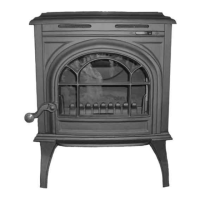when the stovetop temperature is between 250°F (120°C) and 550°F (290°C). The most likely causes of dirty glass
are: not enough fuel to get the stove thoroughly hot, burning green or wet wood, closing the draft until there is
insufcient air for complete combustion, or a weak chimney draw. Indeed, the cleanness of the glass is a good
indicator of the stove operating efciently.
Helpful Hints Worth Repeating
1. Helpful advice on the correct way to start your re.
a) You will need small pieces of dry wood, called kindling, and paper. Use only newspaper or paper that has
not been coated or had other materials glued or applied to it. Never use coated (typically advertising yers) or
coloured paper.
b) Always open the door of the wood stove slowly to prevent suction and drawing smoke into the room.
c) Crumple several pieces of paper and place them in the center of the rebox and directly onto the rebricks of
the wood stove (see product information supplied with your stove). Never use a grate to elevate the re.
d) Place small pieces of dry wood (kindling) over the paper in a “teepee” manner. This allows for good air
circulation, which is critical for good combustion.
e) Light the crumpled paper in 2 or 3 locations. Note: It is important to heat the air in the stovepipe for draft to
start.
f) Fully open the air controls of the wood stove (see the owner’s manual supplied with your stove) and close the
door until it is slightly open, allowing for much needed air to be introduced into the rebox. Never leave the door
fully open, as sparks from the kindling may y out of the stove, causing damage or injury. As the re begins to
burn the kindling, some additional kindling may be needed to sustain the re. DO NOT add more paper after the
re has started.
g) Once the kindling has started to burn, add some smaller pieces of seasoned, dry rewood. Note: Adding
large pieces at the early stages will only serve to smother the re. Continue adding small pieces of seasoned dry
rewood, keeping the door slightly open until each piece starts to ignite. Remember to always open the door
slowly between placing wood into the re.
h) Once the wood has started to ignite and the smoke has reduced, close the wood stove door fully. The
reduction of smoke is a good indication that the draft in the chimney has started and good combustion is now
possible. Larger pieces of seasoned, dry rewood can now be added when there is sufcient space in the rebox.
Adjust the air control setting to desired setting (see the owner’s manual supplied with your stove). Note: The
lower the air control setting, the longer the burn time of your rewood.
2. What type of wood is best to use as rewood?
Dry, seasoned wood should be used. Do not use green, unseasoned wood. Green wood, besides burning at only
60% of the fuel value of dry, seasoned wood, will deposit creosote on the inside of your stove and along the inside
of your chimney. Freshly cut wood has about 50% moisture. A 10 pound log contains 5 pounds of water. Both
hardwood and softwood burn well in this stove. Both woods contain about 8,000 BTU’s per pound, but hardwood
is generally denser, will weigh more per cord, and burns a little slower and longer. Burn beach wood only if its’ salt
content has been washed away in a season of rain and then the wood dried.
3. What does dry, seasoned wood mean?
Wood that has been dried for a period of one year in a well-ventilated and sheltered area would be considered dry,
seasoned wood. Wood from slow-growing trees is generally considered better than wood from fast-growing trees.
To season rewood split and stack it so that air can get to all parts of the wood. Cutting rewood so that it will t
vertically, front to back, makes it easier loading and less likely for the fuel to roll on the glass.
12

